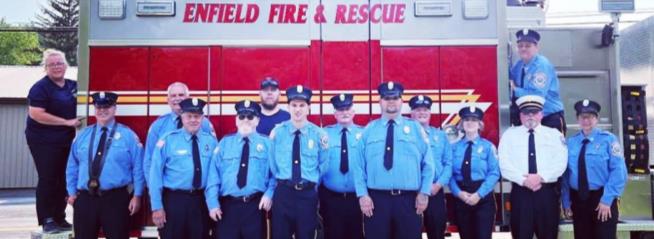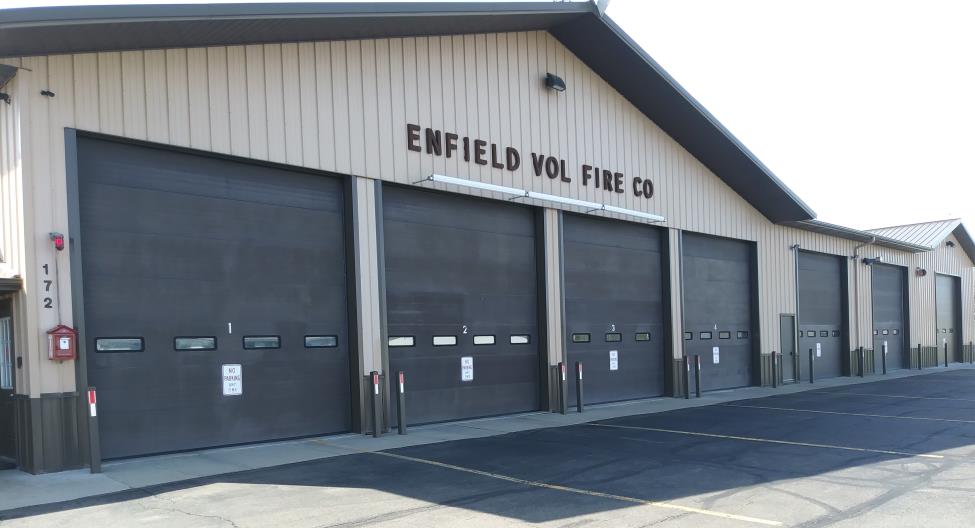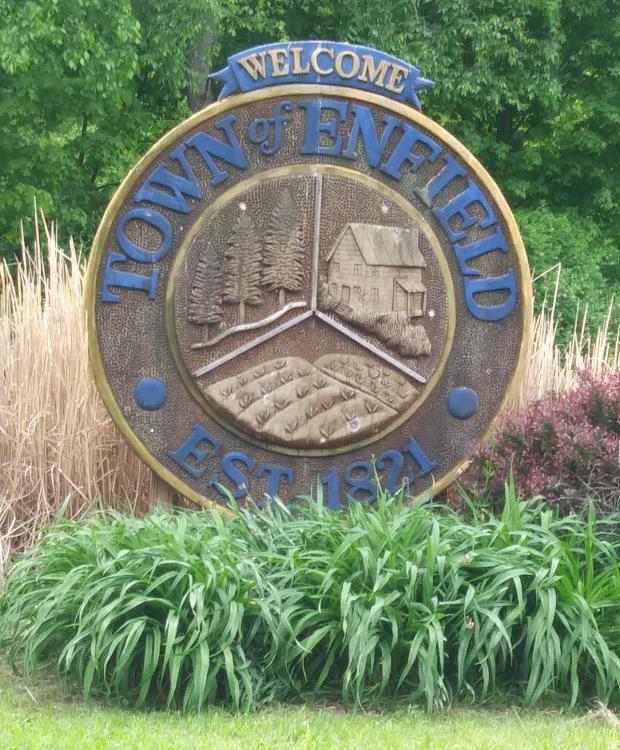Analysis by Councilperson Robert Lynch; June 12, 2023
By Thursday morning of this week, we’ll know whether a decades-long legal bond between the Enfield Volunteer Fire Company (EVFC) and our Town Board will have been severed, likely forever.
And the change will impact you, our Enfield residents; the EVFC; and all who serve it. And if you attend just one Enfield Town Board Public Hearing this year, this is the one you should make time for. It’s that important.

Up for public discussion Wednesday, beginning at 7 PM, are a pair of resolutions that on their face sound too legalistic and “weedy” to matter. But actually, there’s much significance behind the semantics. The resolutions would abolish Enfield’s long-standing “Fire Protection District” and replace it with a “Fire District.” The dropping of that one, three-syllable adjective carries great statutory import. Were the change to occur, governmental oversight of the EVFC’s spending, taxation, and operations would shift from the Town Board to a newly-created and independently-elected Board of Fire Commissioners. The first election for those Commissioners would happen the second Tuesday of this December.
“I remain open-minded and uncommitted on this issue,” I wrote in a website posting back on May 5th. “I suspect that several members of the Town Board, perhaps a majority, prefer the change. But I have heard constituent comments both pro and con,” I wrote.
Today, my view remains unchanged. I suspect at least three members of our Town Board, a bare majority, will support the change, based on those members’ prior statements in recent months. That would provide sufficient Board strength to bring the change about.
And my open-mindedness also remains unaltered. What I’ve found is that my sentiments vacillate back and forth depending on whom I’ve talked to last. Both supporters and opponents of the transformation of oversight raise solid, well-reasoned arguments. Therefore, to the extent that this one Councilperson’s lone vote matters, your arguments at the June 14th Public Hearing will carry much weight.
There’s also been what I’d call a “passion gap” here. As I said at our most recent Town Board meeting May 10th, I’ve sensed public support for the change to be only “lukewarm.” But opposition, though perhaps from those fewer in number, has been “vocal” and “passionate.”
Talk of changing to a scheme of non-partisan, Commission-based Fire Company oversight arose quite suddenly and informally. At the start of 2023, no one had yet publicly advanced it in the modern era. Its first suggestion arose in a February 25th email from Fire Chief Greg Stevenson to this Councilperson. The idea grew legs days later when Stevenson, Fire Company President Dennis Hubbell, Town Supervisor Stephanie Redmond and I held our quarterly Town-EVFC meeting. The idea held promise, some of us thought, though not all of us instantly signed onto the concept.
When the Enfield Town Board next convened in early-March, the Board approved a resolution, one I’d drafted, that authorized the Board to retain specialized legal counsel to research the prospect of change. Yet my wording cautioned that the resolution “in no way commits this Town Board to the … transition,” but instead “merely seeks to inform this Town Board and its constituents of the legal requirements for said transition so as to aid in their further deliberations.”

Supervisor Redmond retained Brad Pinsky of the Pinsky Law Firm in Syracuse to provide us aid. Pinsky attended the April 12th Town Board meeting via zoom and explained the change’s potential advantages and the legal steps needed to take the plunge. In the view of some, including this Councilperson, Pinsky then presented a one-sided view of the issue. He accentuated the advantages; minimized the drawbacks. We never heard the flip side of the argument.
But the April presentation immediately won over the support of Supervisor Redmond. After Pinsky had finished his explanations, Redmond spontaneously (and highly prematurely) beckoned potential Fire Commissioners to step forward and express their interest. The lawyer thereafter drafted the paperwork for the Fire District’s formation, and the Town Board in May set June 14th for the two required Public Hearings. Quite simply, in three months’ time, we’ve come quite a ways.
Déjà vu, anyone? Enfield’s trod this path before. And when it did, our Board took a road that led to a sudden and anticlimactic dead-end.
Back in 2007, when Jean Owens was Supervisor and when the current Enfield Fire Station was much closer to being new, the Town Board also considered changing to Fire Commission oversight. Meeting Minutes from the time indicate that the idea was suggested earlier that year. And then an “Informational Public Hearing” was held August 24th.
What followed from the August Minutes leaves today’s observer with a sense of puzzlement and a thirst for the back story. The Hearing that night convened at Seven O’clock. Then-Attorney for the Town Tim Mattison answered about a half-hour of questions. Then, after he did, the Town Board moved into Executive Session. Twenty-five minutes later, the Town Board emerged from Executive Session and promptly adjourned. The Minutes tell us nothing further. Forming a Fire District was never talked about again… until now.
Anecdotally, 16 years later, those with long memories try their best to fill in the gaps. One recollection reports that some Town Board members couldn’t agree on the first choice of interim members to populate the Commission. Another recollection holds that disagreement centered on the Fire Company’s then, and current, policy that places its station’s meeting room off-limits to most outside groups, including the Town Board. Getting an explanation today of what happened then depends on whom you ask.
But some maintain today’s public attitudes are much different, and so too, they say, is the political climate. This Wednesday’s vote could be a unanimous endorsement of what couldn’t be done in ‘07. Or, perhaps, this Councilperson could cast the lone dissent. Or citizen voices expressed at the Public Hearing could sway several votes to opposition. Perhaps a majority would vote no.
But let’s balance the scales here. Let’s weigh the pro’s and cons of moving to Fire Commission oversight; what are they? In anticipation of Wednesday’s Public Hearing, you deserve to hear the arguments on both sides.
“The most effective form of government (for fire protection) is a fire district,” Brad Pinsky told our Town Board’s April meeting. Why? “For the simple reason there’s only one thing to do,” the attorney said. A Fire District, “has one department; a Department of Fire.” And, it “has one job,” he added, “To oversee fire protection.”
The attorney told the Town Board that the complexity and cost of modern-day fire protection stretches comprehension of the service beyond the scope of interest or the expertise of many a Town Board member.
“Fire protection is so complicated that the Town Board is legally liable for the actions and negligence of the Fire Department in a Fire Protection District,” Pinsky told the Town Board. “The Town Board never has time to govern in a way they need to govern.”
“A Fire District will govern not with a heavy hand, but with a well-informed hand,” Pinsky stated.
The attorney also raised budgetary considerations. Fire protection costs have “skyrocketed,” Pinsky said. And those increases, as he’s observed from his experience with other towns, make it tough for Town Boards to keep tax levies within the State-recommended so-called “two per cent cap.” When a Fire Commission provides oversight, fire protection costs are shed from the Town Board’s Budget. They no longer get counted within the tax-cap regulated levy, Pinsky explained.
But to be blunt, this one Councilperson was less than impressed with Brad Pinsky’s one-sided sales pitch that night. I think he missed the mark. He generalized with problems that may confound other communities and fire districts he may have consulted, but not necessarily this one. We are Enfield. And as most of us know, we can be unique; quirky.

In my opinion, Enfield’s difficulties with its fire company have never been as much of a budget problem as a people problem. Money enters into the discussion, of course. But it invariably intertwines with some personality dispute. Decade after decade, as Town Board members and volunteer firefighters come and go, what always festers among us is a pervasive, corrosive underlying atmosphere of distrust and envy, one that borders on outright enmity, among leaders of the Enfield Volunteer Fire Company, Town politicians, and some of Enfield’s prominent residents. Best put on a bumper sticker, some of us believe the EVFC “spends too much money and has too many toys.” How many times must we draw attention to the Fire Company’s truck wash?
Dissention came to a head last October when our Town Board held its annual Budget Hearing. I’d proposed the Town allot an additional $25,000 in its 2023 Budget to cover purchase of protective clothing (so-called “turnout gear”) for volunteer firefighters. During the course of the hearing, as Fire Company leadership and individual volunteers pleaded their case for the life-saving outerwear, talks veered down blind alleys when critics, including at least one Town Board member, faulted the EVFC for buying a command truck for its Fire Chief and spending thousands of dollars on an annual volunteer banquet.
Will these petty squabbles vanish once oversight gets handed to a Board of Fire Commissioners? I doubt it. They will just travel to a new venue in Enfield politics. Simply put, Brad Pinsky, you don’t know Enfield.
What I most fear is that when responsibility changes, the target of blame will not. I envision this scenario: A Fire Company-friendly Commission sanctions new spending, lots of it; maybe even allows paid staff. The fire tax then rises by double digits. The Town Board holds no control, yet still gets faulted.
Make no mistake. Transition to a Fire District, in theory, provides better financial accountability in one respect. Major purchases, including fire trucks, would become subject to public referenda. But the electorate’s “veto-gate” on runaway spending requires, quite frankly, an engaged electorate. Fire Commissioner elections would happen in December. Capital spending referenda would likely coincide with Commissioner elections. Will Enfield voters bother to participate in such voting? Or will they be singing Jingle Bells instead? Voter turnout in off-year November elections so often disappoints. I doubt turnout for a fire truck’s purchase referendum would break ten per cent.
As for the sometimes-toxic relationship between the Fire Company and Town Government, creation of a Fire District might, indeed, help at the margins. A Board of Fire Commissioners, a panel likely dominated by firefighters or retired firefighters, would find itself less inclined to wrangle with EVFC volunteers. A Fire Commission, I suspect, would whine less over the “truck washes” of the future. It would also less likely resurrect long-settled, yet still-festering grievances. (Yes, they do exist; trust me.)
But as with so many of these arguments, there’s the flip side. Fire Commission elections will most likely draw Fire Company volunteers as their voters and maybe them alone. It follows that company volunteers stand most likely to run for Commission slots. And when they become a Commission majority, will objectivity vanish, as well as any thirst for hard-nosed decision-making? As one prominent Enfield resident passionately told me a few weeks ago, you’d “be putting the fox in charge of the chicken coop.” I’ve heard that same fear from others. It could become a Fire Commission by firefighters, for firefighters.
****
Why do several of my colleagues on the Town Board so eagerly welcome with open arms transition to a Fire District? I sense they have either or both of two motivations:
First, they want to avoid the time, bother, and work of negotiating a new, multi-year contract with the EVFC. Our current contract expires this December. With the Fire Company just having bought a new $825,000 pumper engine, the EVFC’s ask from Town taxpayers is likely to go up, and go up big time. Contract talks could prove messy.

Second, and perhaps equally important, some on our Town Board want to extricate themselves from messes of the human sort; including one that lurks behind the shadows of closed meetings. I would argue it perpetuates a grudge that should have been laid to rest long ago. I can say no more.
Should our Town Board’s majority create a Fire District, and simultaneously abolish our current Fire Protection District, we’d have a second task before us. Within ten days we’d need to appoint the initial, five Fire Commissioners to our newly-created Board. They’d serve until December’s elections choose successors who’d take office in January. Yes, that, too, could prove dicey.
As you can see, I’ve made no decision. I keep an open mind. Moving oversight of the EVFC to a Fire Commission could be the best thing that’s ever happened to Enfield in many a year. Or it could be the worst. Tell us what you think. The meeting’s Wednesday night, the 14th. We’ll save a seat for you. And three-minutes of speaking time as well.
###

